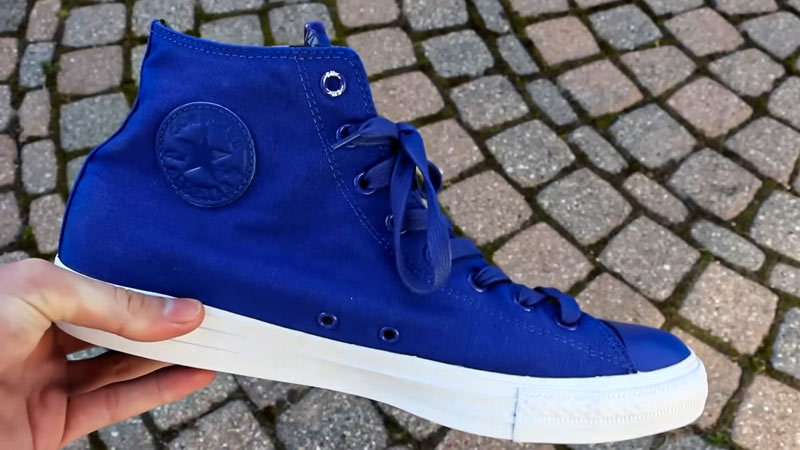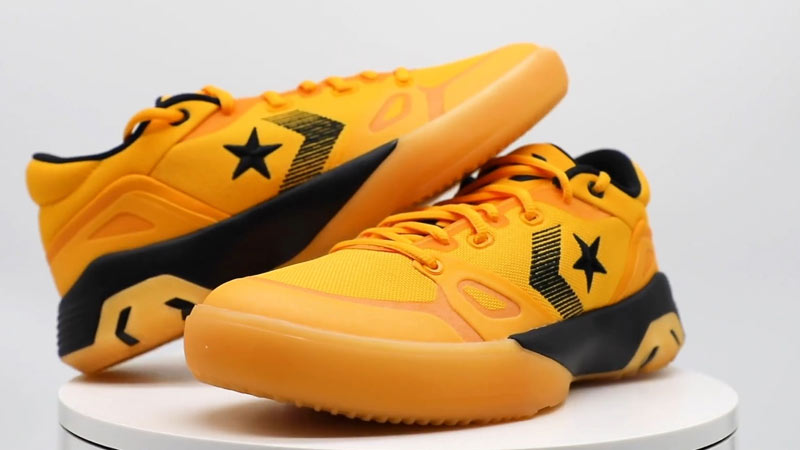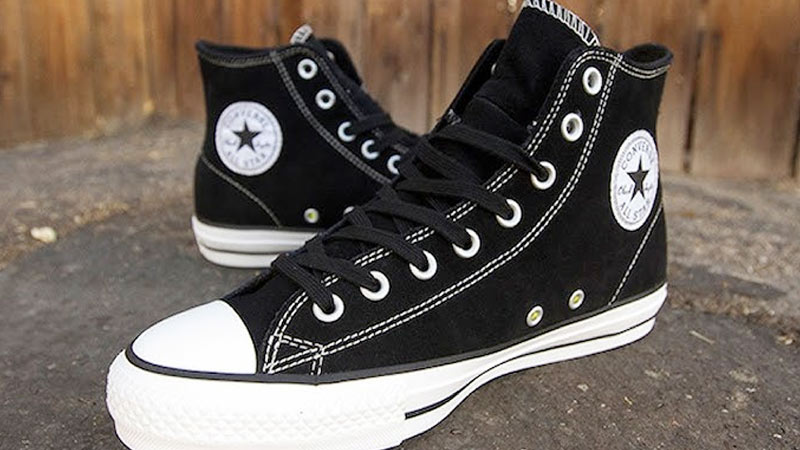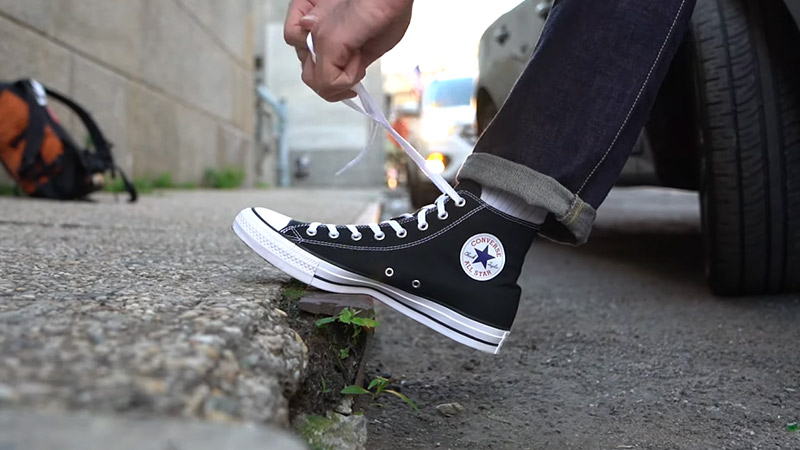When it comes to basketball shoes, there are a plethora of options available in the market, each promising enhanced performance and support on the court. However, one brand that has managed to withstand the test of time is Converse Chuck Taylor.
These classic canvas sneakers have been a fashion staple for decades, but are Chuck Taylors good for basketball?
In this article, we delve into the pros and cons of Chuck Taylor on the basketball court to determine whether they are indeed a suitable choice for serious athletes.
Are Chuck Taylors Good for Basketball?
Converse Chuck Taylors, named after basketball player Chuck Taylor, was initially introduced in the 1920s. At that time, they were designed as basketball shoes and became popular due to their flexibility, simple design, and affordability.
However, it’s important to note that the game of basketball has evolved significantly since then, demanding specialized footwear to support the rigorous demands of the sport.
Pros of Chuck Taylor for Basketball
Style and Culture
Chuck Taylor has an undeniable appeal due to its iconic design and historical significance. They are often associated with the heritage and culture of basketball, making them popular among players who appreciate the retro aesthetic.
Lightweight and Flexible
Chuck Taylors are lightweight and offer great flexibility. This characteristic can be advantageous for players who prioritize agility and quick movements on the court. The shoes allow for better footwork and freedom of motion.
Versatility
While Chuck Taylor may not be ideal for high-intensity games or professional-level play, they can be suitable for casual or recreational basketball.
They can be used for shooting around, practicing skills, or playing non-competitive games, where the focus is more on enjoyment rather than intense performance.
Cons of Chuck Taylor for Basketball
Lack of Support
One of the significant drawbacks of Chuck Taylor for basketball is their limited support. They lack the specialized cushioning and ankle support systems that modern basketball shoes offer.
This can increase the risk of injuries, particularly when making quick lateral movements, jumping, or landing after a jump.
Traction Issues
Chuck Taylors were not designed with basketball-specific traction patterns in mind. The soles may lack the necessary grip needed to maintain stability on the court, potentially leading to slips or falls, especially on dusty or slippery surfaces.
Durability
While Chuck Taylors are durable for everyday wear, the canvas material may not hold up well under the constant stress and rigorous movements involved in basketball.
The lack of reinforced materials in key areas can lead to quicker wear and tear, reducing the lifespan of the shoes.
Do You Wear Converse To Play Basketball?

Converse shoes, particularly the Chuck Taylor All-Star model, have a rich history in basketball. They were originally designed and popularized as basketball shoes in the early 20th century.
However, since then, basketball shoe technology has advanced significantly, and there are now many specialized basketball shoe brands and models available on the market that offer better performance, support, and cushioning for basketball players.
While Converse shoes can still be used for casual or recreational basketball play, they are not typically the first choice for serious basketball players or professional athletes.
Modern basketball shoes are specifically engineered with features like ankle support, cushioning, traction patterns, and materials designed to enhance performance and reduce the risk of injury during intense basketball activities.
If you’re looking to play basketball seriously or competitively, it’s generally recommended to invest in a pair of basketball-specific shoes that are designed to meet the demands of the sport.
However, if you’re just playing for fun or casually shooting hoops, wearing Converse shoes can be perfectly fine.
Do NBA Players Wear Converse?
NBA players do not commonly wear Converse shoes during games. While Converse has a rich history in basketball and was popular in the early years of the NBA, its presence on the professional basketball scene has diminished in recent decades.
However, in 2019, Converse re-entered the basketball market and signed a multi-year partnership with the NBA.
Since then, a few NBA players have been signed as brand ambassadors and have worn Converse shoes during their endorsement deals. It’s worth noting that players often have individual endorsement contracts that require them to wear specific brands.
Some NBA players associated with Converse include:
Draymond Green

The Golden State Warriors forward signed a shoe deal with Converse in 2020. He has been seen wearing Converse shoes during games and promotional events.
Kelly Oubre Jr.
Oubre, who has played for teams such as the Phoenix Suns and Golden State Warriors, also signed a shoe deal with Converse. He has been seen wearing Converse shoes on the court.
Shai Gilgeous-Alexander
The Oklahoma City Thunder guard signed a shoe deal with Converse in 2020. While he primarily wore other brands during games, he has been spotted wearing Converse shoes off the court.
Please note that endorsement deals and player associations with specific brands can change over time. Therefore, it is advisable to check for updates or recent information to know which NBA players are currently associated with Converse or other shoe brands.
What Are the Best Chuck Taylors for Basketball?
While Chuck Taylor has a rich history in basketball, it’s important to note that they are not typically considered the best choice for serious basketball play due to their limited support and traction features.
However, if you still prefer to wear Chuck Taylors for basketball, there are a few models that may offer slightly improved performance compared to the classic Chuck Taylor All-Star:
Converse Chuck Taylor All-Star Pro

The Chuck Taylor All-Star Pro is an updated version of the classic Chuck Taylor All-Star, specifically designed for skateboarding but with some improvements for basketball.
It features a Lunarlon insole for added cushioning and impact protection, which can provide a bit more comfort compared to the traditional Chuck Taylor.
Converse Chuck 70
The Chuck 70 is a modernized version of the original Chuck Taylor design, featuring enhanced materials and construction. While it still lacks specialized basketball features, the Chuck 70 offers slightly better durability and comfort compared to the classic Chuck Taylor.
Converse Chuck Taylor All-Star BB Evo
The Chuck Taylor All-Star BB Evo is a more recent model from Converse that combines elements of the classic Chuck Taylor with modern performance features.
It features Nike React foam cushioning for improved responsiveness and impact absorption, along with a redesigned outsole for enhanced traction on the court.
However, it’s essential to keep in mind that even with these slight improvements, Chuck Taylors are generally not recommended as the best basketball shoes for serious play.
If you’re looking for optimal performance, support, and durability, it’s advisable to explore other basketball-specific brands and models that are specifically engineered for the demands of the sport.
FAQs
Are there any Chuck Taylor models specifically designed for basketball?
No, Chuck Taylors were not specifically designed for basketball. They were originally introduced as basketball shoes in the 1920s but have since transitioned into more of a fashion and lifestyle sneaker.
Converse, the brand behind Chuck Taylor, offers other basketball-specific models like the Converse All-Star Pro, which are designed with modern performance features.
Can I still wear Chuck Taylor’ for basketball if I don’t play professionally?
While Chuck Taylor may not be the best choice for serious or competitive basketball play, you can still wear them for casual or recreational games.
They can be suitable if you prioritize style and nostalgia over performance and are playing in a non-competitive setting where the risk of intense gameplay and injuries is low.
Are there any alternative basketball shoe brands that offer a similar retro aesthetic?
Yes, several alternative brands offer basketball shoes with a retro aesthetic similar to Chuck Taylor. Brands like Puma, Adidas, and Reebok have released models inspired by their vintage designs, providing a blend of style and modern performance features.
These options may offer better support and traction compared to Chuck Taylor while still appealing to those who appreciate the retro look.
What are some key factors to consider when choosing basketball shoes?
When choosing basketball shoes, it’s important to consider factors such as support, cushioning, traction, fit, and durability. Look for shoes with ample ankle support, responsive cushioning for impact protection, a grippy outsole pattern for traction on the court, and a secure and comfortable fit.
Durability is also crucial, especially if you play basketball frequently or at a high level.
Can I use Chuck Taylors’ for other sports or activities?
Chuck Taylors can be suitable for other low-impact activities or sports that don’t require specialized footwear. They are popular choices for activities like skateboarding, casual walking, or light gym workouts.
However, for sports with specific performance requirements, it’s recommended to use shoes designed for that particular activity to ensure proper support, protection, and performance.
Final Words
So, is Chuck Taylor good for basketball? While Chuck Taylor has undeniable appeal as a fashion statement and has historical significance in basketball, they are not the most suitable option for serious basketball players.
The lack of specialized support, traction, and durability features makes them less than ideal for intense gameplay.
However, they can still serve as a decent choice for casual or recreational basketball, where performance demands are not as high. Ultimately, when it comes to basketball shoes, it is crucial to prioritize functionality and performance.
Investing in shoes specifically designed for basketball, with proper cushioning, support, and traction, is essential for optimizing performance and reducing the risk of injuries on the court.







